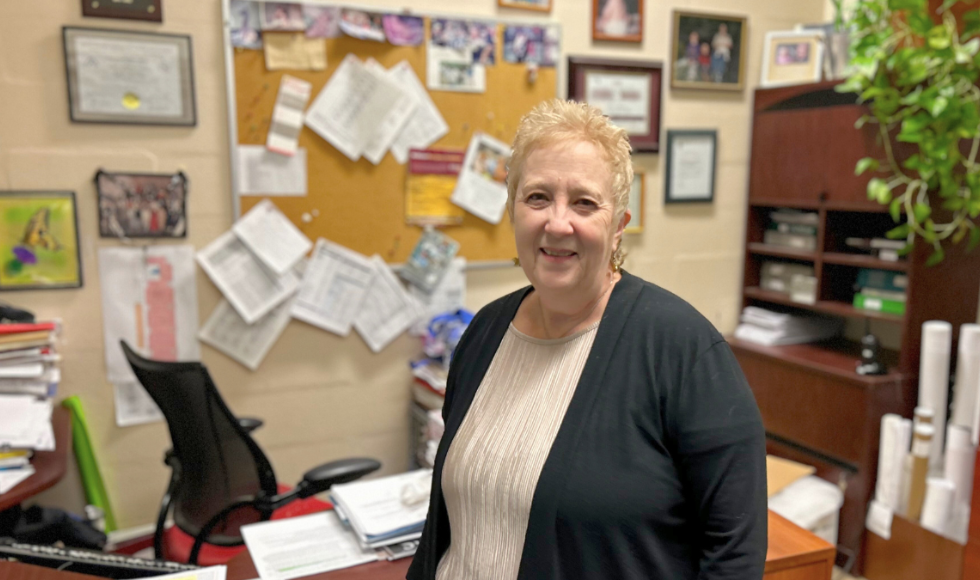Director of animal facilities reflects on 43 years at Mac

After 43 years of service at McMaster, Karen Gourlay, the director of animal facilities, is retiring.
The walls of Karen Gourlay’s office at McMaster University are lined with photos of those she loves — family, colleagues, and pets. Floral valance curtains decorate the window, and well-maintained plants bring warmth to the space, countering the reports stacked on her desk.
Soon, Gourlay will pack up the photos and remove the curtains, marking the end of an era: After 43 years of service at McMaster, the director of animal facilities will clear her office of the reminders of her personal and professional achievements, saying goodbye to animal care and research at McMaster for a retirement filled with family and farm life.
Early passion and aspiration
Gourlay’s passion for animals was evident from a young age. “I always wanted to be a vet.”
However, a childhood encounter with a woman at a campground left her feeling discouraged.
“She said to me, ‘It’s really hard. You have to have good marks,’ and that always stuck with me,” Gourlay reflects. “What children hear is really important — what I heard was that I couldn’t do it.”
Gourlay earned a Bachelor of Science degree at the University of Guelph. When she graduated, a childhood friend who was working at McMaster suggested she apply to the animal facility.
“I was excited because I always had an affinity for working with animals and because I’ve lived here all my life. I grew up on the East Mountain,” Gourlay says.
With his encouragement, she secured a position certifying biological safety cabinets, covering for a maternity leave. This role marked the beginning of her long and impactful career.
Her journey at McMaster was shaped by the mentorship and support of several key figures. Larry Belbeck, the then-university veterinarian and director of the central animal facility, and Sally Cleland , an interim director, played pivotal roles in her development.
“I was so immature when I started,” Gourlay says. “Sally was really great at coaching and gave me so much responsibility.”
Her experiences helped her transition into supervisory and assistant director roles, eventually becoming the director of animal facilities in 2021.
Contributions to animal science and ethical research
Gourlay’s contributions to animal science and ethical research are profound. She oversees the operation of eight animal facilities where McMaster faculty conduct research, including those on the university’s main campus, at Hamilton Health Sciences, and with commercial partners.
Her responsibilities include ensuring compliance with various regulations, managing budgets, staffing, and training of animal technicians.
“The stakes are high, very high. There’s a lot of pressure,” she acknowledges.
One of Gourlay’s most significant achievements is her involvement with the Canadian Council on Animal Care (CCAC), an organization established in 1968 to provide oversight to the ethical care and use of animals in science.
The organization conducts evaluations every three years, assessing physical structures, administrative protocols, and ethical reviews. In her involvement with the CCAC, Gourlay has developed certification programs for laboratory animal technicians and served on 17 different assessment panels to provide oversight and evaluations across Canada. She also contributed to rewriting the CCAC ethics document, a testament to her commitment to advancing ethical standards in animal research.
Gourlay is a strong advocate for the 3Rs principle — replacement, reduction, and refinement — which aims to minimize the use of animals in research by replacing them with non-sentient alternatives, reducing the number of animals used, and refining procedures to minimize pain and distress.
Her dedication to ethical research was recognized in April 2025 with the highest award from the CCAC, the Harry C. Rowsell Lifetime Achievement Award.
“It’s just something I never could have dreamed of,” Gourlay says. “When I was that nine-year-old at the campground, I couldn’t have dreamed of this.”
She was also a nominee for McMaster’s 2024 President’s Award for Outstanding Service, which recognizes those who have gone above and beyond to support the mission of the university.
Jonathan Bramson, vice-dean of Research with the Faculty of Health Sciences, is ecstatic but unsurprised to see Gourlay’s contributions recognized by the CCAC and the university.
“Karen is a treasured employee who has provided tremendous service to our community,” Bramson says.
“She has earned immense gratitude from the McMaster and scientific community at large.”
Family, farm life and retirement
As Gourlay transitions into retirement, she looks forward to spending more time on her hobby farm in Freelton. The farm is home to a variety of animals, including four dogs — Dewey, Brooks, Echo, and Siri — and 20 sheep, many with cheeky names like BaaBaa (the black sheep), Sadie (aka Blazing Saddles) and Rosie.
“Our animals have been involved in research projects, too,” she says. “Back when we had llamas, they were used in an antibody protection study.”
In retirement, Gourlay plans to focus on refinishing antiques and managing the farm.
Gourlay’s family is perhaps her proudest accomplishment. She and her husband, Garth, who is involved in dog showing and photography, have four sons and nine grandchildren. “A number of them are teachers, and the majority of the women in my family are in health care,” she proudly notes.
Reflecting on her career and profession, Gourlay worries animal research is misunderstood.
“Ninety per cent of the population doesn’t understand what we do,” she says. In a poignant twist of fate, Gourlay found herself experiencing the full circle of her life’s work while supporting a close family member through cancer treatment.
“The irony is not lost on me that the very treatments helping them were developed through the kind of animal research I’ve dedicated my career to overseeing and improving.”



